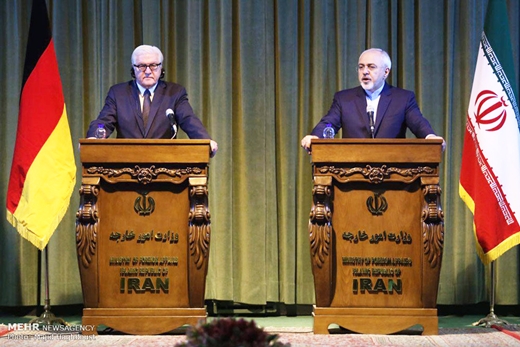Iranian Foreign Minister Mohammad Javad Zarif says the Islamic Republic will never allow Saudi Arabia to exclude it from regional equations.
Speaking at a joint presser with his German counterpart Frank-Walter Steinmeier in Tehran on Saturday, Zarif said Iran is after good neighborly ties with its neighbors.
“Security must be provided for all as we all live next to each other in the region,” he said.
“We are not after eliminating Saudi Arabia, and, on the other hand, do not allow Saudi Arabia to eliminate Iran from the region,” he said.
Saudi Arabia’s “attempt to eliminate Iran has led to bloodshed and the stoking of confrontations in the region, and this has to stop,” he said.
On Syria
Responding to a question on Syria, Zarif said the Islamic Republic is ready to cooperate with all concerned governments to resolve the Syrian crisis. He said Iran believes that measures taken by the Russian government in Syria are in line with fighting the Takfiri IS terrorist group.
He said military operations against IS are only one dimension of the fight against the terrorist group, adding, among other measures, financial support for IS should stop.
The Iranian top diplomat also said that foreign intervention in Syria should serve the purpose of expediting conflict resolution there.
Such an outcome, he said, has so far proven elusive due to some countries’ insistence on excluding certain individuals from Syria’s political future.
Resolution 2231 not violated by Iran missile tests
In response to another question about recent remarks by US officials about Iranian missile tests, Zarif said the US has a history of adopting wrong stances, emphasizing that Iranian missile tests have nothing to do with United Nations Security Council Resolution 2231 (2015) as the Iranian missiles have not been designed to carry nuclear warheads.
He reiterated that Iran has never had and will never have a nuclear weapons program.
Iran-German ties
Zarif said Tehran-Berlin ties are “age-old” and are based on “mutual respect and common interest.”
He said the ties “can serve as a decent model for Iran’s relations with other European countries.”
Steinmeier, for his part, said the two sides to the recent agreement between Iran and P5+1 should build trust in order to reduce potential tensions.
The German top diplomat arrived in Tehran on Saturday on a two-day visit, a first such visit by a German foreign minister in 12 years.
Munich Security Conference (MSC) meeting
Following the press conference, the officials proceeded to attend a core group meeting of the Munich Security Conference (MSC).
Chaired by Wolfgang Ischinger, the chairman of the MSC, and the Iranian foreign minister, the meeting is to address the implementation of the July 14 nuclear agreement between Iran and six other countries, Iran’s regional role, the security architecture in the Middle East as well as the economic and energy policy implications of the Vienna agreement.
The meeting is also joined, among others, by Afghan Foreign Minister Salahuddin Rabbani, Iraqi Foreign Minister Ibrahim al-Jaafari, Prime Minister of Iraqi Kurdistan Region Nechirvan Idris Barzani, UN Deputy Special Envoy for Syria Ramzy Ezzeldin Ramzy, Deputy Secretary General of the European External Action Service Helga Schmid, President of the Foreign Affairs Committee of the French National Assembly Elisabeth Guigou, and Chairman of the German Bundestag Foreign Affairs Committee Norbert Rottgen.
The MSC has been serving as an international platform for dialog on foreign and security policy since its foundation in 1963.
[…]
